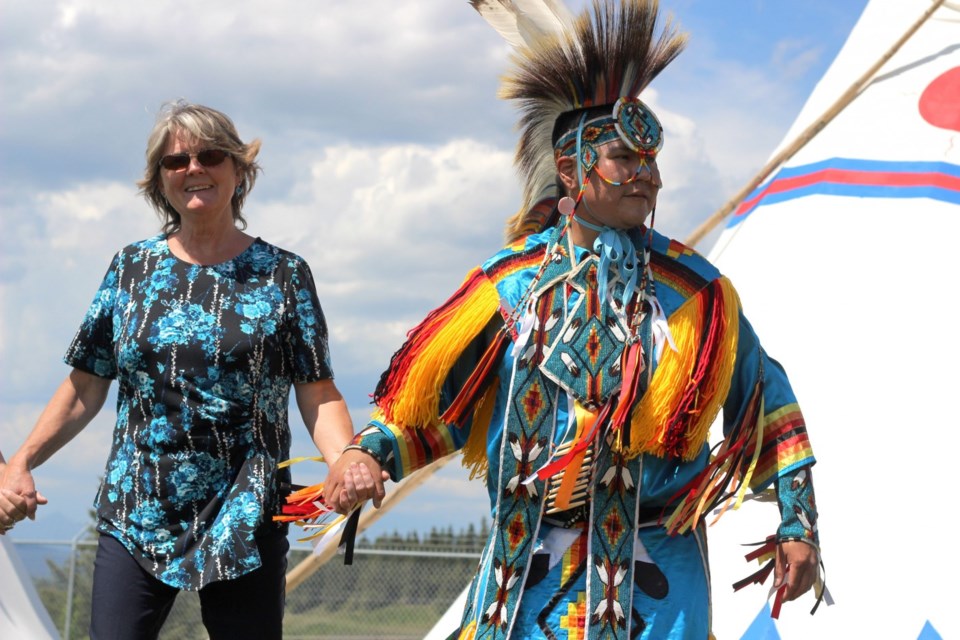The relationship between Cochrane and Morley has iced over compared to earlier days, according to a renowned Stoney Nakoda First Nation elder Tina Fox.
The relationship between Cochrane and Morley has iced over compared to earlier days, according to a renowned Stoney Nakoda First Nation elder Tina Fox. But years ago, Fox said she remembers a time when strong friendships were more common between the two communities.
Back when Cochrane was only first being established and ranchers began setting up their operations, Stoney Nakoda First Nation members were often contracted by ranchers for work.
Rocks were cleared from fields, fence posts were pitched, and other chores completed – for pay – by Stoney members.
Tina Fox recalled the amicable relationship as a “strong friendship,” even though it only was a handful of Nation members that were part of that.
But since Cochrane began modernizing and quickly increasing its population, Fox said those days are long over and a overhaul on relationship building is needed.
“Today, there’s so many new people in Cochrane. New people have moved into Cochrane that don’t even know that we exist as their neighbours,” Fox said. “We can be friends, be friendly neighbours without the stress, but we have to build that trust to go further.”
Here are the top things Fox, who is helping build and teach Indigenous learning courses to town staff and Rotarians, said needs to happen to do that:
History and acknowledgment of past mistakes
To begin with, Fox said Cochranites gaining a solid understanding of who the Stoney people are is vital for any understanding between Nation and non-Nation members.
“I think it will help for Cochranites to know our history, and to know who we are and how we feel about non-native people. Because of what happened to us, we’re kind of not too confident around non-native people,” Fox said.
The Stoney community should try to learn about Cochrane
Cochrane is always changing and modernizing while still holding on to its historical past. Fox said she hopes her community can learn about Cochrane’s culture as it is today.
“I’m hoping that – I don’t know how well it would go – but my community also needs to learn about non-native people and know that they’re not all racist and they’re not all bad and they’re not all greedy,” Fox said.
She added that learning how businesses work in Cochrane might help increase the likelihood of partnerships between the two communities.
Know that the Stoney Nationcontributes to the economy
“We rely on your stores, your Safeway, all your grocery stores, your Walmart, because we don’t have any of that, Fox said. “So in a sense we contribute to the economy of Cochrane and there’s none coming back to us from Cochrane because we don’t have any of those amenities.”
Fox said she wants Cochrane people to understand that Stoney members shopping in stores is significant and that many members also work in town.
Fox added that when Nation members work off reserve, they are subject to income tax, despite common misconceptions that they are exempt.
Non-Nation members must abandon stereotypes
Fox said one of the biggest hindrances to the relationship between the two rural communities is a lack of trust and respect for Nation members. One example Fox gives is being followed in shopping centres.
“As soon as we walk in, there will be someone tailing us, pretending to shop. I was a person who was taught never to take anything that was not mine, ever. For someone to do that to me is very insulting to me,” she said.
Know that the Stoney Nation is a resilient band
Fox has shared stories to non-Nation members about residential schools and the trauma that came afterwards, but she said it’s important that the knowledge become more widespread.
“People need to understand the atrocities that happened to us to understand that we have proven we are resilient – especially this tribe. They tried to take our land, language, culture – everything. Our spirituality.
But Stoney people have kept their language and we still have all our ceremonies and our dances and our songs. We are a resilient people,” Fox said. “Despite everything that happened, here we are.”
“Sure we are plagued with addictions and violence, but it’s not the whole tribe that is violent, there’s only a few visible ones.”




